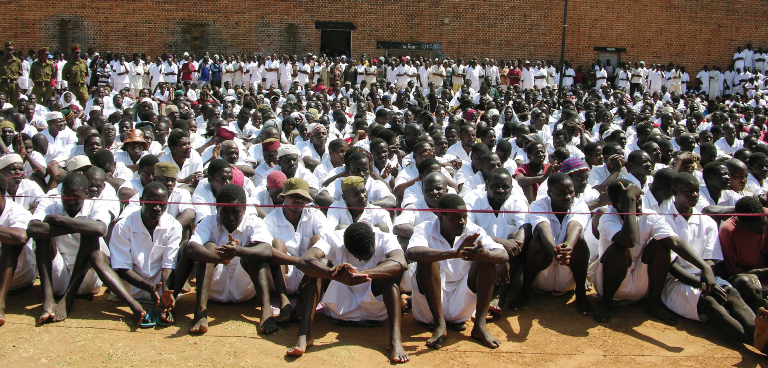Prisons Bill gathers dust for 20 years
Taxpayers will continue coughing millions to feed inmates in the country’s congested prisons due to government’s delays to finalise review of the Prison Act of 1956, one of the human rights bodies has warned.
For almost 20 years government has been reviewing the Correctional Services Bill, formerly the Prisons Bill, which was drafted in 2003, and according to Centre for Human Rights Education, Advice and Assistance (Chreaa), the country’s prisons hold over double their capacity and continue to exert pressure on the National Budget.

Statistics show that the population of inmates in the country’s 31 prisons, with a total capacity of 5 600, has shot up to about 17 000 from 12 000 in 2020.
In an interview on Wednesday, Chreaa executive director Victor Mhango observed that overcrowding raises concerns on accommodation, access to healthcare and proper sanitation services.
Said Mhango: “This problem does not only affect prisoner’s well-being but, also, the public through huge National Budget allocations which remain insufficient.”
Mhango adds that the delay to change the laws in the face of the problems which have been voiced by human rights defenders, prisoners, and even ex-prisoners, is clear evidence that people in detention in the country do not enjoy even the most basic of their human rights, which is violation of their right to dignity and freedom from cruel, inhuman and degrading treatment.
The Ministry of Justice has since indicated that so far five Bills have been Gazetted ready to be introduced in the current sitting of Parliament.
These are Tobacco Industry Bill, Persons with Disabilities Bill, Data Protection Bill, Electronic Transaction Bill and Ombudsman Bill.
Ministry of Justice spokesperson Frank Namangale, in an interview this week said the Correctional Services Bill is still on government’s priority list of Bills to be tabled in the current sitting of Parliament.
Said Namangale:” It has been undergoing processes before it is published in the Gazette and later to have it introduced in Parliament.
“These rigorous processes include having it discussed before a Cabinet committee and later reviewed and approved by a full Cabinet.”
Namangale added that all being equal, government anticipates having close to 15 Bills introduced in Parliament in the current sitting.
Malawi Prisons Service has over the years decried the dwindling budgetary allocations, saying the situation has impacted on its operations and establishments.
Data shows that in the 2020/21 financial year, Prisons requested K2.6 billion, but received K1.56 billion while in the 2021/22 financial year, its budget was also K2.6 billion, but were allocated K1.52 billion. In the last fiscal year, government allocated them K1.3 billion against a request of K2.8 billion.
Last month, Ministry of Homeland Principal Secretary responsible for legal services Steve Kayuni indicated that government will continue engaging stakeholders to fast-track the review of the Bill.
But Mhango argues that the debate on the Bill has been there for a long time without tangible results and prison conditions in the country have deteriorated as evidenced by gross disregard of the most basic human needs.
He said: “Adopting the Bill, will indisputably change the narrative of the state of Malawian prisons. The Bill initiates a total overhaul of the Malawi Prison Service by turning it into a correctional service focused on rehabilitating offenders.”
If passed, Mhango said reforms such as the parole system and release on temporary licence will be introduced which assist deserving prisoners to get out of prison before completing their actual sentences.
Among others, the Bill also revives punishment through community service; a development which will see offenders for minor crimes getting their punishment while out of prison and still being productive while serving their sentences.
The Bill also makes provision for health services to all correctional facilities in the country through establishment of clinics in all prisons, which currently are only found in central and maximum prisons.
Said Mhango: “This answers to the challenge of poor access to health care that most prisons in Malawi report. In essence, the Bill effectively recognises the needs of people in prison and reflects respect for their human rights.”
The Penal Reform International visited Malawi in 2003 to assist in the drafting of the Bill.
This is anticipated to change the prison framework from an outdated colonial era model adopted in 1956.
The initial Bill was shelved in the late 2000s for not being in line with Malawi’s socio-economic realities. In 2013, a Special Law Commission drafted a revised Bill which was published in 2018.
But since then, the Bill is yet to be debated or passed into law.
Our sister newspaper The Nation of October 27 2023 quoted Parliamentary Committee on Defence chairperson Ralph Jooma during a stakeholders’ meeting on the same Bill as saying legislators are eager to see it being passed to improve the welfare of prisoners in the country.
“This is an urgent matter to us, so once it comes to Parliament, we will definitely pass it. We are also aware that for it to pass in Parliament we need to amend the Constitution by removing the word ‘prison’ and instead use ‘correctional services’, and we are ready to do that,” said Jooma.






One Comment